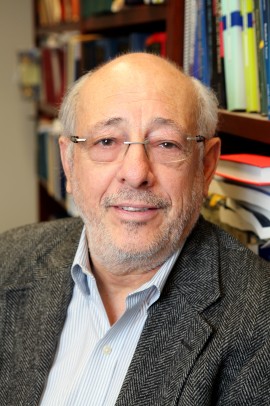Biochemistry researcher elected to AAAS membership

Jack Kaplan, head of biochemistry and molecular genetics, was elected a fellow of the American Association for the Advancement of Science.
Jack Kaplan, the Benjamin Goldberg Professor and head of biochemistry and molecular genetics, was elected a fellow of the American Association for the Advancement of Science.
Kaplan, associate director for basic science in the Cancer Center, was cited for his contributions to understanding fundamental mechanisms in the biochemistry, biophysics and physiology of ion transport.
“I am extremely honored by this recognition from the AAAS,” Kaplan said. “It’s a tribute to the outstanding group of students and fellows who have worked with me. This award reinforces the importance of investing in interdisciplinary approaches to the investigation of basic biological processes.”
Throughout his career, Kaplan has studied how the membrane that surrounds cells controls the entry and exit of ions that are important for maintaining cellular processes. For many years his main focus was on the sodium pump, a protein in the cell membrane essential to balancing salts and fluids for kidney and cardiac functions. Digitalis, the most widely used medication for heart failure, targets this protein.
While researching the sodium pump, Kaplan developed the use of “caged” compounds that rapidly release biologically active substances when exposed to light. The technique is now used in many areas of physiology, biochemistry and neurobiology.
Kaplan became interested in the processes that regulate the body’s levels of copper while he was studying another pump that moves copper ions out of cells. That ion pump is disrupted in Wilson’s disease, a rare inherited disorder that causes copper to accumulate in the liver, brain and other vital organs.
The copper ion is an essential micronutrient in humans. Roles for copper have recently been identified in wound healing, neurodegeneration and tumor progression. However, it is toxic at elevated levels, and a variety of cellular mechanisms are involved in its regulation.
Kaplan is also a fellow of the Royal Society and the Biophysical Society. A graduate of the University of Manchester who received his doctorate from the University of London, he has been at UIC for 11 years.
